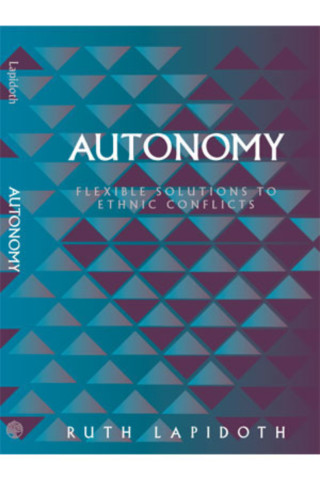Autonomy
From Chechnya to Bosnia, from the Kurds to the Palestinians, demands for separatism are fueling bitter and bloody conflicts. Yet, as this innovative study demonstrates, disputes between central governments and independence-minded minorities need not always escalate into violence and secession. Autonomy, by virtue of its essential adaptability, can offer a workable and peaceful compromise.
Ruth Lapidoth first dissects the concept of autonomy, exploring its origins, examining the roles it can play, and distinguishing among its types. With scrupulous objectivity, she then presents more than a dozen richly documented case studies of autonomy in action. Drawn from four continents and detailing failures as well as successes, these studies underline autonomy’s variety and versatility. Lapidoth’s pragmatic approach and impeccable scholarship frame the issues and lay out the factors likely to foster successful outcomes.
This carefully assembled volume examines . . . the Aland Islands, Memel, the South Tyrol, Greenland, West Berlin, Eritrea, etc. Her meticulous discussion of each case is accompanied by abundant references.
- CHOICE
Ruth Lapidoth
Ruth Lapidoth (née Eschelbacher) is Greenblatt Professor Emeritus at the Hebrew University of Jerusalem. She was born in Germany in 1930 and immigrated to Palestine in 1938. She studied law at the Hebrew University, and did post-graduate studies in Paris (Ph.D. at the Law School, and Diplôme at the Institut des Hautes Etudes Internationales of the University of Paris). From 1956 until 2001 she taught at the Hebrew University (since 1980 as Full Professor), in the field of international law, the law of the sea, and the Arab-Israel conflict and its resolution.
In addition, she has taught and done research at various institutions abroad: the University of Paris (1971), the Woodrow Wilson Center in Washington, D.C. (1973-1974), New York University School of Law (1976-1977), the Center for the Study of Marine Policy at the University of Delaware (1976-1977), the University of Geneva (1977), the Bellagio Study and Conference Center (1978 and 1993), the University of Southern California (1982-1983), Tulane (1986) and Northwestern (1987) Universities, Duke University School of Law (1989), United States Institute of Peace (1990-1991), Georgetown University Law Center (1992, 1993,1997 and 2011), the Institute of Public Law and International Relations of Thessaloniki (1995), St. Antony’s College, Oxford (1996-1997), the Ludwig-Maximilians University, Munich (1999-2000 and 2003) and the University of Melbourne (2000).
During 1984-1986 she was Chairman of the Editorial Board of the Israel Law Review, and during 1985-1989 served as Chairman of the Israel Universities Study Group for Middle Eastern Affairs. During 1994-1996 she was the Director of the Institute for European Studies at the Hebrew University.
In addition to her academic career, she has been active in the diplomatic field: she was a member of the Delegation of Israel to the United Nations (1976) as well as to the Humanitarian Law Conference (1977) and the Red Cross Conference (1981). She has participated in part of the negotiations for the Peace Treaty between Egypt and Israel (1979), and was the Legal Adviser to the Ministry for Foreign Affairs of Israel (1979-1981). In 1999 she was invited to join a group of experts that advised the High Commissioner on National Minorities of the Organization for Security and Cooperation in Europe. She is a member of the Israel Council of Foreign Relations.
Her judicial activity involved her membership in the arbitration panel established in order to solve a boundary dispute between Egypt and Israel, including the Taba area (1986-1988). Since 1989 she is a member of the Permanent Court of Arbitration in The Hague.
Professor Lapidoth has written nine books and more than a hundred articles dealing with questions of international law, the law of the sea, human rights, autonomy, the Arab-Israel conflict and its resolution, and Jerusalem.
She is the 2000 recipient of the Prominent Woman in International Law award from the WILIG group of the American Society of International Law. In 2001 she received the Gass Prize for her contribution to research on Jerusalem. In 2004 the Israel Bar Association awarded her the “Women in Law” Award for her special achievements in legal academic research. In 2006 she received the Israel Prize for excellence in Legal Research. In 2018 she received Lifetime Achievement Award of the Israeli Association for International Studies.

